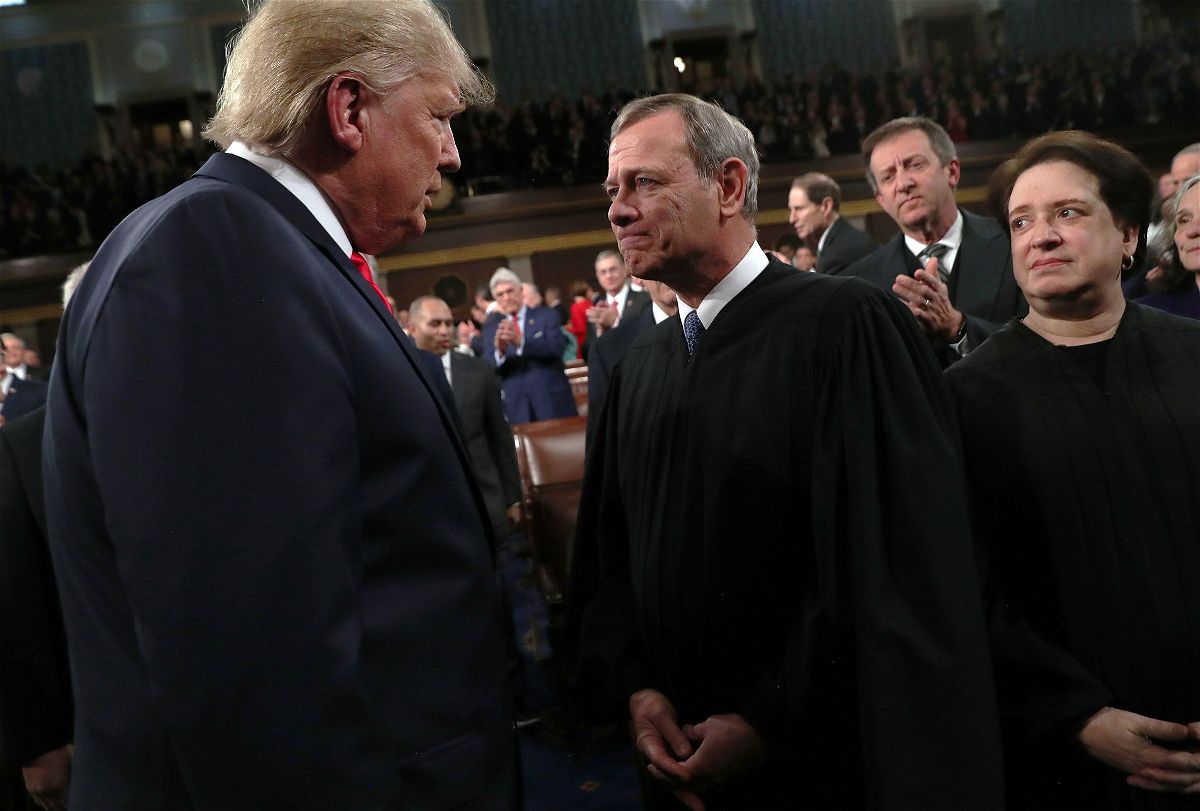Trump’s on the ballot, but the Supreme Court left key constitutional questions unanswered

Originally Published: 06 MAR 24 11:36 ET By John Fritze and Marshall Cohen, CNN
(CNN) — This much is certain: Former President Donald Trump’s name will appear on the ballot this year as voters in every state choose a president.
But while the unsigned, 13-page opinion the Supreme Court handed down Monday decisively resolved the uncertainty around Trump’s eligibility for a second term, it left unsettled questions that could some day boomerang back to the justices.
Could Democratic lawmakers, for instance, disqualify Trump next January when the electoral votes are counted if he wins the November election? Could a state keep a president seeking a third term, in violation of the 22nd Amendment, off its ballot?
Some degree of uncertainty after the decision was likely unavoidable. The high court was scrambling on an expedited timeline to quickly decide a fraught dispute with an eye toward consensus among justices who are often sharply divided on major political and cultural questions.
In the end, the justices unanimously agreed states can’t boot presidential candidates because of the 14th Amendment’s insurrectionist ban, though it splintered over why that is the case.
“There are a lot of questions that remain,” said Donald Sherman, chief counsel at the liberal watchdog group Citizens for Responsibility and Ethics in Washington, which filed the suit on behalf of six Republican and independent voters seeking to remove Trump from the Colorado ballot.
“I don’t know that the off-ramp that the court created is as elegant as they think it is,” he said. “And they are just hoping that the issue does not come back to them.”
Trump applauded the decision as “well crafted” in remarks at his Mar-a-Lago club.
“I think it will go a long way toward bringing our country together,” he said. “Essentially, you cannot take somebody out of a race because an opponent would like to have it that way.”
Perhaps given the tight timeline or the desire for unanimity, the justices didn’t delve into every facet of the case. Here are some of the issues that remain undecided.
How to deal with ‘insurrectionist’ candidates for state office?
Unlike the Colorado state courts that grappled with ballot challenges against Trump, the justices didn’t touch fundamental questions about what counts as an “insurrection” or what sort of processes should be used to determine if a candidate took part in one.
While that allowed the majority to avoid specifically discussing Trump’s attempts to overturn the 2020 election, the lack of clarity could prove particularly important for disputes involving “insurrectionists” running for state office going forward.
The Supreme Court made clear that states “may disqualify persons holding or attempting to hold state office.” Yet without a blueprint for resolving such cases, state courts will have to figure out how to adjudicate them on their own.
“Cases involving state office holders are very much left open,” said Ilya Somin, a law professor at George Mason University. “The definition of insurrection, what it means to engage in it, what kind due process guarantees are required … all those issues may have to be dealt with in the future.”
Already pending at the Supreme Court is an appeal from a former New Mexico county commissioner who was removed from office because of his role in the January 6, 2021, attack on the US Capitol.
Cowboys for Trump founder, and convicted Capitol rioter, Couy Griffin was removed in 2022, the first time since 1919 that the “insurrectionist ban” was enforced.
As of now, it is the only successful application of the ban against someone for January 6-related conduct.
A state court removed Griffin from office and New Mexico’s top court dismissed his appeal and Griffin appealed to the US Supreme Court. The justices have taken no action on that appeal yet, possibly because they wanted to resolve Trump’s case first.
Can a future constitutional crisis be avoided?
Long before the Supreme Court decided the Trump matter, some legal scholars had been sounding alarms that the decision could provoke a “catastrophic constitutional crisis” if it didn’t spell out the role Congress plays in disqualifying a candidate for insurrection under Section 3 of the 14th Amendment.
If Trump wins the election, that theory goes, Democrats might attempt to disqualify him before electoral votes are counted in January 2025 during the same once-perfunctory process that pro-Trump rioters interrupted when they attacked the US Capitol in 2021.
Political pressure to do so would likely swell if Trump is convicted in any of the four criminal cases pending against him – especially with the timeline of his federal election subversion trial increasingly bumping up against the November election.
Some experts believe the court’s opinion headed off that possibility by requiring Congress to first enact enforcement legislation spelling out the process for disqualifying a candidate – a requirement that, given modern political divisions on Capitol Hill, would almost certainly be unattainable. (That portion of the opinion, however, only garnered the support of five justices.)
“It appears the court is limiting how Congress goes about enforcing Section 3 through legislation, which may also limit Congress if it attempts to refuse to count electoral votes,” said Derek Muller, an election law expert at Notre Dame Law School.
But some saw ambiguity in the opinion – and the possibility of a constitutional showdown.
“The opinion is unclear on what happens after the election if Trump wins,” said Gerard Magliocca, law professor at Indiana University and one of the nation’s top experts on the ban and who supported Trump’s disqualification.
“At best, it’s unclear,” he said. “And therefore, if Trump wins, people are going to try these things. And it just makes the presidential transition – if Trump wins – more complicated, unpleasant and problematic than it needed to be.”
What about other qualifications for candidacy?
One of the key questions heading into the February 8 oral arguments in the Trump dispute was whether states could remove a clearly ineligible candidate from the ballot before an election or whether the Constitution’s eligibility rules only govern whether that candidate may serve in office.
The Constitution requires a president be at least 35 years old. Could a state dump a 25-year-old candidate from the ballot because they are clearly ineligible? What if a president attempted to run for a third term, in violation of the 22nd Amendment? The seemingly preposterous hypotheticals came up repeatedly during the Trump ballot cases.
The six Colorado voters who sued Trump raised the point by calling attention to a 2012 case involving a presidential candidate who was born in Guyana, despite the Constitution’s requirement that the president be a “natural born citizen.”
Justice Neil Gorsuch, then a judge on the Denver-based 10th US Circuit Court of Appeals, wrote that states are permitted to exclude candidates from the ballot if they are constitutionally ineligible from serving. But the Supreme Court hasn’t addressed the issue and didn’t offer clues on the point in Monday’s opinion.
“Some of the majority’s logic about states not being able to disqualify people seems to apply to other electoral qualifications as well,” Somin said.
Somin predicted a candidate attempting to skirt those other qualifications required by the Constitution would lose. The difference, he said, is that the 14th Amendment explicitly gives Congress the “power to enforce, by appropriate legislation, the provisions” of the amendment. The court’s conservatives nodded to this in their opinion, noting the provision that “vests in Congress the power to enforce” the insurrectionist ban.
The other eligibility requirements, he noted, which are spelled out in Article II and other constitutional amendments, don’t have similar caveats attached.
“But that isn’t clearly stated in the majority’s opinion,” Somin said. “One can imagine litigation arising over that.”
The-CNN-Wire
™ & © 2024 Cable News Network, Inc., a Warner Bros. Discovery Company. All rights reserved.



